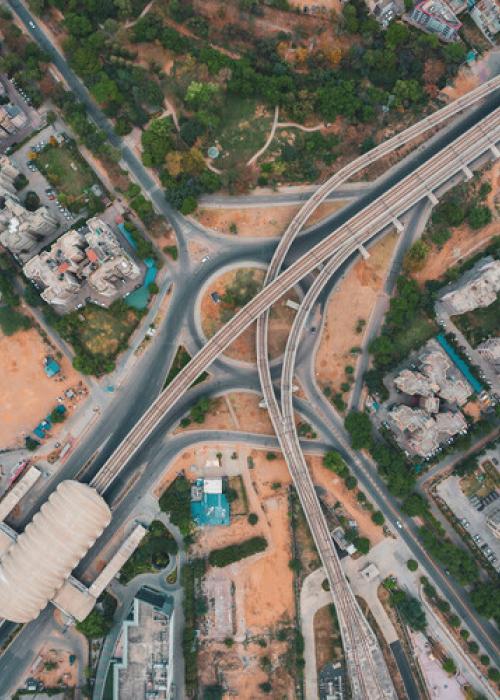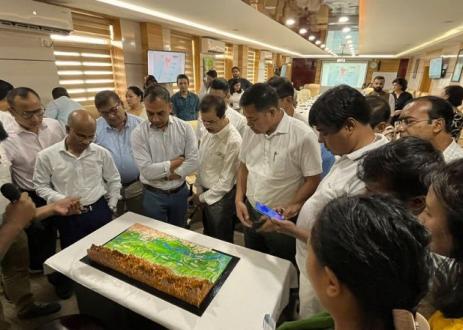
Driving Urban Evolution for Economic Revolution
Building dynamic urban spaces that fuel progress, enhance connectivity, and create livelihood opportunities.
With 68% of the world’s population projected to live in urban areas by 2050, India is expected to add 416 million urban dwellers, amplifying challenges such as spatial inequality, inadequate infrastructure, congestion, and environmental degradation—all of which hinder economic productivity and resilience. Despite these challenges, India is now the 5th largest economy, with cities emerging as key drivers of economic growth. Rapid urbanization, while fueling economic expansion, also increases risks of environmental degradation, climate vulnerability, and soco-economic inequalities, making it essential to address the intersection of urban and economic development.
This necessitates the need for sustainable urban planning, integrating strategic spatial and economic planning, resilient infrastructure, and climate adaptation measures to foster economically productive and ecologically resilient regions.
By engaging with local, regional and national level stakeholders, the vertical uptakes the on-ground implementation of projects, builds capacity, conducting extensive research, and ensuring to informing policy that enables data-driven planning and decision-making. The goal is to enable holistic economic development that is aligned with urban development. Our team brings in an interdisciplinary approach to urban planning and economic development, adding value and expertise to achieve the mentioned goals.
Growth Hubs (MoU with NITI Aayog)
WRI India supported the ‘City-Region Growth Hubs’ initiative under NITI Aayog by providing technical expertise to pilot the strategy template with a focus on economy, social well-being, infrastructure, sustainability and climate resilience. Pilot projects in Varanasi, and Visakhapatnam are already advancing, with blueprints approved for Surat Economic Region and Mumbai Metropolitan Region.
National Urbanization Project (NUP)
WRI India contributed to drafting the upcoming National Urbanization Policy (NUP) report, which was presented to the Prime Minister’s Economic Advisory Council. Invited by the Council, WRI India provided recommendations to address critical issues and policy challenges related to India’s urbanization. The session highlighted key findings and facilitated discussions to refine these recommendations.
Transit Oriented Development
This initiative supports Indian cities in adopting spatial planning strategies that integrate land use and transport, promoting compact development and sustainable mobility. Transit-oriented development (TOD) is a key strategy for urban sustainability and competitiveness. WRI India advances TOD through research, technical assistance, policy advisory, and capacity building in Bengaluru and Delhi.
Thriving Eco-City regions
The ‘Thriving Eco City-Regions’ initiative helps city-regions become more inclusive, resilient, and productive by shaping policies and fostering regenerative growth. We collaborate with experts, and local stakeholders to provide technical support, research, and capacity building, empowering communities to drive change.
Local Area Plans and Town Planning Schemes (LAPTPS)
WRI India, as an ‘Anchor Institute’ empanelled with MoHUA, provided technical assistance, legislative reviews, and capacity building for cities under a National pilot scheme for mainstreaming LAPs and TPSs. The initiative promotes land reconstitution driven brownfield redevelopment and planned greenfield expansion as alternatives to acquisition-centric urban development. Dehradun (Uttarakhand), Aizawl (Mizoram), and Srinagar (Jammu & Kashmir) have been supported through this program.
Form-Based Codes
Form-Based Codes (FBCs) are planning and zoning tools that regulate development based on the physical form of the built environment rather than separating land uses. By prioritizing the design and quality of public spaces, FBCs aim to enhance overall quality of life and foster vibrant, people-centric urban environments. As part of its work under the Smart Cities Mission, WRI India developed a set of model policies, implementation guidelines, an evaluation matrix, and a case study compendium on Form-Based Codes for the Ministry of Housing and Urban Affairs (MoHUA).
Driving Urban Evolution for Economic Revolution is a part of Sustainable Cities.
Contact Ankita Rajeshwari for media inquiries.

Thriving Eco City-regions
Supporting city-regions transition towards becoming more inclusive, ecologically resilient and economically productive.
Part of Sustainable Cities
Transit-Oriented Development
Supporting Indian cities in adopting land use and transport integration to promote compact, sustainable urban development.
Part of Sustainable Cities
